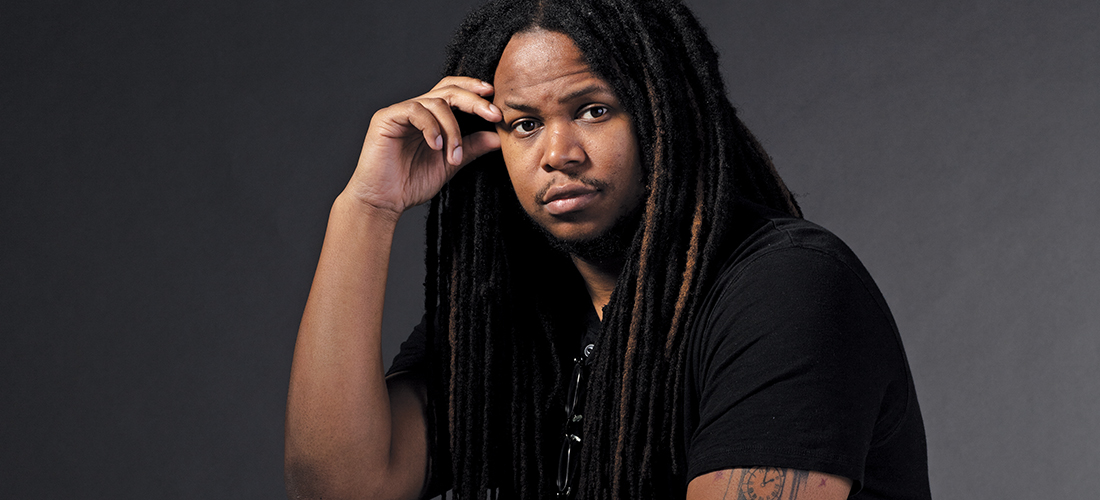
A Time to be Blunt
Filmmaker Maurice Hicks wishes he didn’t have to talk about it, but he does and so he will
By Billy Eye
The most common way people give up their power is by thinking they don’t have any.
— Alice Walker
I spent an afternoon with filmmaker Maurice Hicks over lunch at Natty Greene’s recently. We talked about A Letter to My Son, a short film he made in 2015 that has become an unexpected, though not entirely welcome, cultural touchstone due to recent events.
A Letter to My Son is a heart-wrenching, unflinching monologue focusing on an African American man as he speaks to the son he may or may not have in the future, conflicted as to whether it would be appropriate to usher a child into an imperfect society where all too often, it seems, black lives don’t matter.
There are so many resonant moments packed into this emotionally drenching 10-minute soliloquy, like this one: “I’m afraid that every time you go out on a Friday night, I’ll quietly say, ‘Lord, please bring him home safe.’ That with every urgent news flash bulletin on the TV I’m hoping, I’m hoping that’s not my son laying dead in the streets. That’s what continually swirls through my head. You see, I’m afraid that now . . . I’m afraid to have you. Afraid to bring you into a world that damn sure doesn’t feel like it’s welcoming you.”
“I made it as a cathartic exercise,” Maurice says. “To kind of work through my frustrations and some of my concerns about the way the world was headed socially and how African Americans, and particularly African American men, were being treated.” The “letter” was a way for the filmmaker to process confounding, self-perpetuating, systemic injustices. “So, full disclosure, one night I got tipsy on Crown Royal and was just bearing my soul on the page. I wrote it in two hours.”
Maurice turned to writing partners and friends he trusts for honest feedback before committing to filming what could be seen as a contentious script.
“I suggest to anyone who writes something that they feel is true to themselves — that they want to be true to themselves — that they should have people they can bounce ideas off of who will be honest with you about how something could potentially be perceived,” he says. “I spoke to Dave Norris, the producer of the film, and asked, ‘Can some of these statements fly? Because I’m being particularly blunt in the film.’ And he was like, ‘Do you believe in them? Are they true?’ And I said, ‘Absolutely, they’re all true. These are all instances that happen on a regular basis and they’re well documented.’ And Dave said, ‘Go for it.’”
The film stars Cranston Johnson, at the time a relatively unknown actor who’s since been tapped for a number of prominent motion picture and network TV roles including Detective Hanson on Hap and Leonard for SundanceTV and Luke Taylor on Filthy Rich, a FOX series that premiered this fall. “I knew that Cranston could easily breathe the humanity into the film that it sorely needed because I feel like many groups of people, I’m not going to name names — but many groups of people are almost immune to black anger. Black rage does nothing for them.”
Instead, Maurice attacked it from a different perspective. “When you’re coming from a place of vulnerability and fear,” he says, “it’s a softer approach and I feel like that can penetrate hearts much easier than just this constant anger. Too many people have seen that. And while I think it’s more than valid, some people are tired of it and it’s not working for them.”
Filming took place at locations all around downtown Greensboro over two shorter-than-expected days. “It was like magic when we did it,” Maurice says of directing his 10-page script. “It’s literally just a block of text for ten pages. From start to finish, Cranston did the entire thing in one take. All the subsequent takes were just for coverage. I really wanted to focus on Cranston’s performance.” What emerges is an Oscar-worthy achievement.
A Letter to My Son was selected for more than 20 film festivals in 2015 including RiverRun International, one of the most prestigious film festivals in the Southeast. Cranston Johnson picked up a few awards including Best Actor in a Short at Rahway International Film Festival that year. “I won an audience award a couple places,” Maurice says. “I lost track because, while those awards are all important, I didn’t do it for that.”
Longleaf Film Festival screened the short in 2015. This year they’ve invited back a cadre of filmmakers to host an event called FilmExchange featuring stories revolving around the African American experience, police brutality, discrimination and inequity in America. “They asked me to be a part of it and I was completely on it,” Maurice says.
Still, Maurice would like nothing more than for this film to be totally irrelevant — a moment lost to the past. He describes the recent attention to A Letter to My Son as a bittersweet reality. “It was my hope as a writer, as an African American man, that one by one these issues would be eliminated so that the short would become invalid. It would be like, ‘Oh, wow. That was a really unfortunate place that we were in all those years ago, but I’m so happy that’s not the case today.’” But it has not come to pass.
“I hate to say this, but every time an African American is killed under suspect circumstances, my phone rings off the hook, emails blow up. So it’s bittersweet because I love talking about it and bringing attention to the situation, but at the same time it’s another painful reminder that there is truth from this story, that it is valid, that the dialogue is worthy of conversation.”
Maurice Hicks insists he’ll always answer the phone, respond to those emails, show up at the festivals when asked but, “I can’t wait for the day that I don’t need to show this anymore, don’t need to talk about this again. We’re not there yet, so I’ll still be there every single time they ask me to run my mouth.” OH
Billy Eye is O.G. — Original Greensboro.





